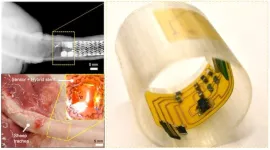(Press-News.org) An independent review, Uniting the UK’s Health Data: A Huge Opportunity for Society, published today (8 November 2024), has found that complexities and inefficiencies are impeding the use of the UK’s rich sources of health data to improve people’s health and lives. Researchers and analysts frequently have to wait many months – or even years – to securely access health data to improve care and for vital research into diseases like dementia, cancer and heart disease.
Led by Professor Cathie Sudlow OBE, the independent review was commissioned by the Chief Medical Officer for England, NHS England’s National Director for Transformation, and the UK National Statistician.
The Sudlow Review calls on policymakers and healthcare leaders to recognise that health data should be treated as critical national infrastructure with leadership and investment to match. It provides five recommendations to remove barriers, simplify processes and enable safe and secure data use across the UK.
Professor Sudlow said: “We are simply not maximising the benefits to society from the rich abundance of health data in the UK. For example, research about health conditions affecting millions of people across the UK is far too often prevented or delayed by the complexity of our systems for managing and accessing data. We are letting patients and their families down as a result. This review shows that getting this right holds a great prize, for our own care and for an effective healthcare system for everyone. We need to recognise our national health data for what they are: critical national infrastructure that can underpin the health of the nation.”
The UK has rich, abundant sources of health data. We are unique worldwide, thanks to the NHS and a population of 67 million people all largely seen in the same health system with data that goes back decades. The data are important for our care as patients but can also be used to support the delivery of equitable health, care and public health services, as well as research and innovation to benefit patients and the public. Data relevant to health also come from sources beyond the NHS: data on social care, housing, pollution and more.
Professor Sudlow was commissioned to map the health-relevant data across the four nations of the UK and to evaluate how data can be better used to improve health while maintaining privacy and trust. She consulted hundreds of individual and organisational stakeholders as part of the review process, including patients and the public.
The review emphasises that the real power comes when datasets from different sources are linked together. For example, we can only really know if breast cancer screening is improving cancer outcomes by connecting the data from national breast screening programmes to data on cancer cases and long-term survival from national cancer registration systems.
It also stresses the importance of the privacy, confidentiality and security of health data, with the development in recent years of highly secure data environments to provide access to de-identified data only for approved studies and certified analysts.
Prof Sir Chris Whitty, Chief Medical Officer for England said: “Using data from multiple sources is essential to improve current patient care, make the NHS more effective and improve outcomes for future patients through research. This report will help us use data more effectively for current and future patients, whilst maintaining patient confidentiality.”
Surveys over the last 15–20 years have consistently shown that people in the UK overwhelmingly support the use of their health data, with appropriate safeguards, to benefit themselves and others. One of the five recommendations in the review calls for ongoing and coordinated engagement with patients, public and health professionals to guide developments, noting the need for a single system in England for NHS data access opt-outs that does not impose any burden on busy GPs.
The review points to several examples of transformational use of health data for public benefit in the UK. In particular, the national response to the COVID-19 pandemic drove remarkable progress in broadening secure access to health-relevant data for patient and public benefit. One example is the data-driven RECOVERY trial which led to the widespread use of treatments such as dexamethasone to treat severe COVID-19, saving hundreds of thousands of lives worldwide. But successes like this are all too uncommon because of the complexity of our data systems and data governance, it reports.
The review points out that:
Access to existing national data collections is often difficult or slow. Access to data currently held by NHS England can take many months or even years.
Many data are only accessible for COVID-related analysis and research (for example general practice data and national cardiovascular audits) but not to tackle other health conditions, such as other infectious diseases, cancer, heart disease, stroke, diabetes and dementia.
More complex types of health data generally do not have national data systems (for example most laboratory testing data and radiology imaging).
Linking together and analysing data from the health and care system to data from other sectors, such as education, employment, and earnings, can be particularly challenging and holds up nationally important work to understand the wider determinants of health.
These barriers delay or prevent hundreds of health research studies that could improve our health and wellbeing.
Ian Diamond, UK National Statistician, said:
“The opportunities to use data to help to improve the health of our fellow citizens are unlimited. This can happen both through improving the delivery of healthcare and by informing policy for prevention and cure. However, this will only happen effectively if both health and socioeconomic data are shared smoothly in an ethical, secure and transparent manner. This wonderful review by Professor Sudlow provides a clear call to action to improve the use of data in healthcare and I thank her for all the work it has entailed.”
Five recommendations
The Sudlow Review’s recommendations provide a pathway to establishing a secure and trusted health data system for the UK:
Major national public bodies with responsibility for or interest in health data should agree a coordinated joint strategy to make England’s health data a critical national infrastructure.
Leading government health and research bodies should establish a national health data service for England with accountable senior leadership.
The Department of Health and Social Care should oversee and commission a strategy for ongoing coordinated engagement with patients, public, health professionals, policymakers and politicians.
The health and social care departments in the four UK nations should set a UK-wide approach for data access processes, and proportionate data governance.
National organisations in the four UK nations should develop a UK-wide system for standards and accreditation of secure data environments (SDEs) holding data from the health and care system.
END
Contact: Health Data Research UK Communications team at comms@hdruk.ac.uk and +44 (0)7594 514 007
(Health Data Research UK has provided secretariat support for the Sudlow Review.)
Notes to editors
Access the full report and its executive summary once embargo has lifted (00:01 on Friday 8 November 2024) at: https://bit.ly/3AyluPP
Uniting the UK’s Health Data: A Huge Opportunity for Society was commissioned by Prof Sir Chris Whitty, Chief Medical Officer for England; Dr Tim Ferris, former National Director of Transformation, NHS England; Vin Diwakar, National Director of Transformation (interim), NHS England; and Prof Sir Ian Diamond, UK National Statistician. This was done with the support of the Chief Medical Officers of the four nations of the UK and the Government Chief Scientific Adviser.
Professor Cathie Sudlow OBE is a medical doctor with almost three decades of clinical experience as a general physician, neurologist and stroke specialist in the NHS. Her research interests have always been firmly embedded in the world of ‘big data’ with a focus over the last 15 years on leading large-scale, open-science initiatives that bring a better understanding of the causes and consequences of health and disease across the life course and enable the discovery of new and improved approaches to prevention, early detection, diagnosis and treatment. For most of the period during which the review was written, she was Chief Scientist and Deputy Director of Health Data Research UK (HDR UK) and Director of the British Heart Foundation (BHF) Data Science Centre at HDR UK. Cathie now leads the Medical Research Council’s Adolescent Health Study, while maintaining an advisory role at HDR UK. She is Chair of Neurology and Clinical Epidemiology at the University of Edinburgh and a Fellow of the Academy of Medical Sciences.
Health Data Research UK (HDR UK) has provided secretariat support for the Sudlow Review.
HDR UK is the national institute for health data science and works to accelerate trustworthy use of health data to enable discoveries that improve people’s lives. Its vision is for large-scale data to benefit every interaction with patients, every clinical trial and every biomedical discovery, and to transform public health. The institute works in partnership with the NHS, industry, charities and universities to realise the potential of the UK’s health data in life-changing research. Patients and the public are actively involved in shaping HDR UK’s work and ensuring it delivers public benefit. It is an independent charity supported by nine of the largest government and charity research funders in the UK.
END
UK’s health data should be recognized as critical national infrastructure, says independent review
2024-11-08
ELSE PRESS RELEASES FROM THIS DATE:
A 36-gene predictive score of anti-cancer drug resistance anticipates cancer therapy outcomes
2024-11-07
BIRMINGHAM, Ala. – In 1937, President Franklin Roosevelt signed the National Cancer Act, launching a nationwide effort to combat the disease. Eighty-seven years later, despite significant progress, cancer treatment often falls short, with 50 to 80 percent of patients not responding to treatment and more than 600,000 cancer deaths annually in the United States.
What if clinicians could predict the success of any cancer treatment, ensuring each patient receives the most effective care?
The challenge lies in the diverse nature of the disease. There are hundreds of different types of cancers, characterized by the specific type of cell from which they originate. Even patients ...
Someone flirts with your spouse. Does that make your partner appear more attractive?
2024-11-07
Picture this: You’re at a bar when someone starts hitting shamelessly on your spouse or significant other, who doesn’t flirt back. As the scene unfolds, your base instincts kick in—annoyance, anger, jealousy—followed by a heightened sexual desire for your partner. You’re ready to reclaim the attention that should be rightfully yours, correct?
Not necessarily, according to a new study in the Journal of Sex Research by researchers at Reichman University in Herzliya, Israel, and ...
Hourglass-shaped stent could ease severe chest pain from microvascular disease
2024-11-07
ROCHESTER, Minn. — A study at Mayo Clinic suggests that an hourglass-shaped stent could improve blood flow and ease severe and reoccurring chest pain in people with microvascular disease. Of 30 participants in a phase 2 clinical trial, 76% saw improvement in their day-to-day life. For example, some participants who reported not being able to walk around the block or up a flight of stairs without chest pain were able to do these ordinary physical activities at the end of a 120-day period. Clinical measures of blood flow related to the microvasculature of the heart significantly improved during ...
United Nations ratifies framework to protect people on cash app
2024-11-07
As mobile-money services were growing at a rapid clip in the developing world 10 years ago, University of Florida computer scientists and cybersecurity experts Kevin Butler and Patrick Traynor were early sentinels, raising concerns about the lack of security that could lead to real problems for the user.
In a 2014 study, the two professors from UF’s Department of Computer and Information Science and Engineering, uncovered security vulnerabilities of mobile cash apps, especially in the Global South, where such technologies were becoming essential in the absence of robust banking systems.
“Our early work uncovered ...
Oklahoma State basketball team joins the Nation of Lifesavers
2024-11-07
http://newsroom.heart.org/news/oklahoma-state-basketball-team-joins-the-nation-of-lifesavers?preview=8409af5e5a5f3127f6aec7e122cc9673STILLWATER, Okla., October 28, 2024 — The Oklahoma State University (OSU) men’s basketball team participated in an American Heart Association Hands-Only CPR (cardiopulmonary resuscitation) training to learn the correct rate and depth of CPR compressions to be confident and capable when faced with a cardiac emergency. Learning Hands-Only CPR is the skill needed to join the Association’s Nation of Lifesavers™ movement, which is focused on doubling survival rates ...
Power of aesthetic species on social media boosts wildlife conservation efforts, say experts
2024-11-07
Facebook and Instagram can boost wildlife conservation efforts through public awareness and engagement, according to a study published in the peer-reviewed journal Environmental Communication.
The findings based on the caracal – a wild cat native to Africa with distinctive tufted ears – demonstrate how social media can harness support for the predators, which some farmers shoot and poison.
Results show that the mammal’s similarity to a domestic feline has attracted thousands of followers to internet feeds about caracal conservation. ...
Researchers develop robotic sensory cilia that monitor internal biomarkers to detect and assess airway diseases
2024-11-07
Xiaoguang Dong, assistant professor of mechanical engineering, is leading a team of researchers that has developed a system of artificial cilia capable of monitoring mucus conditions in human airways to better detect infection, airway obstruction, or the severity of diseases like Cystic Fibrosis (CF), Chronic Obstructive Pulmonary Diseases (COPD) and lung cancer.
The research was published in the November 4 issue of PNAS in the article, “Sensory Artificial Cilia for In Situ Monitoring of Airway Physiological Properties.”
In their paper, the researchers noted that continuously ...
Could crowdsourcing hold the key to early wildfire detection?
2024-11-07
The 2023 blaze in Lahaina, Hawaii, which claimed more than 100 lives and burned 6,500 acres of land across Maui, is a tragic example of how rapid wildfire spread can make effective response efforts impossible, resulting in the loss of life and property.
What if technology could help people detect wildfires earlier? The solution could already be in your pocket: a mobile phone.
USC computer science researchers have developed a new crowdsourcing system that dramatically slashes wildfire mapping time from hours to seconds using a network of low-cost mobile phones mounted on properties in high fire threat areas. In computer simulations, the system, FireLoc, detected blazes igniting ...
Reconstruction of historical seasonal influenza patterns and individual lifetime infection histories in humans based on antibody profiles
2024-11-07
Reconstruction of historical seasonal influenza patterns and individual lifetime infection histories in humans based on antibody profiles
#####
In your coverage, please use this URL to provide access to the freely available paper in PLOS Biology: http://journals.plos.org/plosbiology/article?id=10.1371/journal.pbio.3002864
Article Title: Reconstructed influenza A/H3N2 infection histories reveal variation in incidence and antibody dynamics over the life course
Author Countries: United Kingdom, China, United States
Funding: see manuscript END ...
New study traces impact of COVID-19 pandemic on global movement and evolution of seasonal flu
2024-11-07
UNDER EMBARGO UNTIL 19:00 GMT / 14:00 US EASTERN TIME THURSDAY 7 NOVEMBER 2024
Increased capabilities for genomic surveillance have offered new insights into global viral evolution;
Seasonal flu showed a ‘remarkable’ bounce back to pre-pandemic levels once international air travel resumed;
Regions with fewer COVID-19 restrictions were associated with sustained flu virus transmission.
Seasonal influenza epidemics impose substantial burdens on healthcare systems and cause >5 million hospitalizations of adults each year. The current approach to influenza vaccine development requires comprehensive surveillance ...



